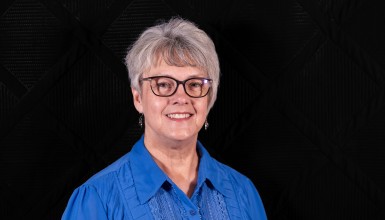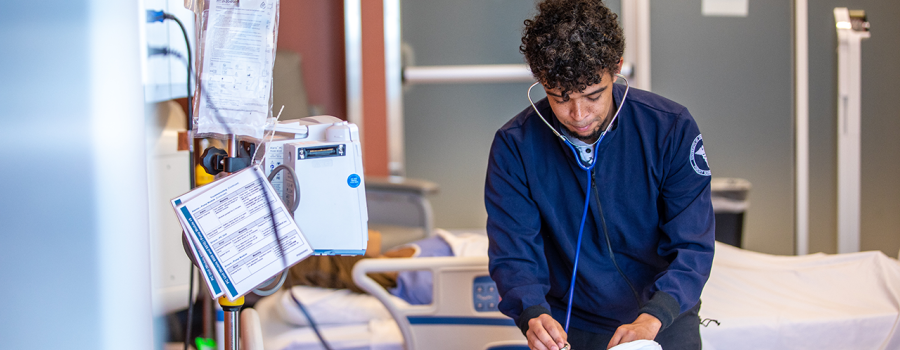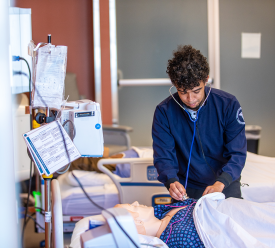Healthcare workers should be their patients’ greatest allies.
Allied health is a growing field that’s perfect for those who want a career that blends compassion, medicine, research, and communication. If that sounds like you, Cumberlands is the perfect place to be. Here, you’ll have a broad curriculum in allied health sciences that will provide you with pathways to a career in allied health or to further education – you decide! In allied health, you’ll have opportunities to assist underserved populations while making a real impact on your community. Do you already have human services, health, or nursing program college credits? Great! You can seamlessly pivot your education into an allied health major without missing a beat.
By the Numbers
Programs & Requirements
* The credit hours listed on this page only reference the specific program requirements and is not reflective of the total hours necessary to receive your degree. Cumberlands requires all students obtain a minimum of 60 hours for an associate’s degree and a total of 120 hours for a bachelor’s degree. Transfer and prior learning credits may be counted toward those totals.
To learn more about our General Education Requirements, please visit the page referenced below or explore our Academic Catalog.
Online Bachelor of Applied Science in Allied Health Sciences
Dive into the core principles and foundational knowledge of the allied health industry by pursuing a Bachelor of Applied Science. You’ll be provided with a broad curriculum that covers all the allied health sciences basics, plus goes more in-depth academically than our online associate degree program. Through this bachelor’s degree program, you will learn to integrate scientific knowledge into your work, advocate for patients and their families, strengthen administrative skills, and more.
Course Requirements
- HESS 233 - Functional Human Anatomy and Physiology
- HLTH 130 - Foundations of Health Science
- SOWK 131 - Intro to Social Work and Social Justice
- NURS 100 - Medicaid Nurse Aide OR NURS 137 - Introduction to Nurse Aide Skills
- NURS 101 - Medical Terminology
- NURS 231 - Ethics in Healthcare
- PSYC 131 - Basic Psychology
- BADM 339 - Principles of Human Resources Management
- SOWK 237 - Human Behavior in the Social Environment
Choose three courses from the following:
- AHS 230 - Applied Nutrition for the Dietary Manager
- AHS 231 - Food Service Management
- SOWK 432 - Addictions and Recovery
- COUN 445 - Grief and Crisis Intervention
- HLTH 335 - Introduction to the Study of Disease
- HESS 333 - Nutrition
- NURS 339 - Healthcare and Social Policy
- NURS 334 - Healthcare Communication
Online Associate of Applied Science in Allied Health Sciences
If you’re looking for an online program you can complete at your own pace that gives you all the basic knowledge you need about the allied health field, then Cumberlands is the place for you. You’ll learn all the foundational knowledge and skills you need to succeed in a wide array of healthcare positions – all of which make a real difference in the lives of the people in your community. From nutrition to addiction recovery to social policy, you’ll learn all you need to enter the healthcare industry.
Course Requirements
- HESS 233 - Functional Human Anatomy and Physiology
- HLTH 130 - Foundations of Health Science
- SOWK 131 - Intro to Social Work and Social Justice
- NURS 100 - Medicaid Nurse Aide OR NURS 137 - Introduction to Nurse Aide Skills
- NURS 101 - Medical Terminology
- NURS 231 - Ethics in Healthcare
- PSYC 131 - Basic Psychology
Minor in Allied Health Sciences
Our minor in allied health sciences is completed on campus at Cumberlands. From functional human anatomy and physiology, to medical terminology, to basic psychology, you’ll learn foundational healthcare concepts that are sure to add value to your major field of study – and, of course, to the career you pursue once you complete it.
Course Requirements
- HESS 233 - Functional Human Anatomy and Physiology
- HLTH 130 - Foundations of Health Science
- SOWK 131 - Intro to Social Work and Social Justice
- NURS 100 - Medicaid Nurse Aide OR NURS 137 - Introduction to Nurse Aide Skills
- NURS 101 - Medical Terminology
- NURS 231 - Ethics in Healthcare
- PSYC 131 - Basic Psychology
- BIOL 240 - Introductory Microbiology
- BIOL 243 - Introduction to Human Anatomy
- BIOL 244 - Human Physiology
- NURS 100 - Medicaid Nurse Aide
- NURS 101 - Medical Terminology
- NURS 231 - Ethics in Healthcare
- NURS 331 - The Nursing Profession Today and Tomorrow
- NURS 334 - Healthcare Communication
- NURS 335 - Nursing in a Multicultural Environment
- NURS 339 - Healthcare and Social Policy
- NURS 432 - Global Health
Note: This emphasis is only available to students already admitted to the ADN program.
Take the Next Step
Program Mission
Cumberlands offers a broad allied health sciences curriculum that provides students of all backgrounds, including underserved populations, the opportunity to earn a degree which prepares them for successful careers in healthcare.
Allied Health Career Outcomes
Careers listed may need education or training beyond an undergraduate degree. Data from U.S. Bureau of Labor Statistics
Clinical Laboratory Technician: $60,780
Clinical Laboratory Technician: $60,780
Clinical laboratory technologists and technicians perform medical laboratory tests for the diagnosis, treatment, and prevention of disease. Most clinical laboratory technologists and technicians work in healthcare settings such as hospitals, medical and diagnostic laboratories, and doctor’s offices. Most work full time.
Dental Assistant: $46,540
Dental Assistant: $46,540
Dental assistants provide patient care, take x rays, keep records, and schedule appointments. Almost all dental assistants work in dentists’ offices. Most work full time.
Diagnostic Medical Sonographer: $80,850
Diagnostic Medical Sonographer: $80,850
Diagnostic medical sonographers and cardiovascular technologists and technicians operate special equipment to create images or to conduct tests. Most diagnostic medical sonographers and cardiovascular technologists and technicians work in healthcare settings, such as hospitals and offices of physicians. Although most are full time, part-time work is common.
Respiratory Therapist: $77,960
Respiratory Therapist: $77,960
Respiratory therapists care for patients who have trouble breathing—for example, because of a chronic condition such as asthma. Most respiratory therapists work full time. Because they may work in medical facilities that are always open, such as hospitals, they may have shifts that include nights, weekends, or holidays.
Medical Assistant: $42,000
Medical Assistant: $42,000
Medical assistants complete administrative and clinical tasks, such as scheduling appointments and taking patients’ vital signs. Most medical assistants work full time. They are employed in physicians’ offices, hospitals, outpatient clinics, and other healthcare facilities.
Home Health Aide: $33,530
Home Health Aide: $33,530
Home health and personal care aides monitor the condition of people with disabilities or chronic illnesses and help them with daily living activities. Home health and personal care aides work in a variety of settings, including clients’ homes, group homes, and day services programs. Most aides work full time, although part-time work is common. Work schedules may vary.
Common Questions
According to the Association of Schools Advancing Health Professions (ASAHP), “Allied health may be defined as those health professions that are distinct from medicine and nursing” and is a field which “encompasses a broad group of health professionals who use scientific principles and evidence-based practice for the diagnosis, evaluation and treatment of acute and chronic diseases; promote disease prevention and wellness for optimum health, and apply administration and management skills to support health care systems in a variety of settings.” Some estimates suggest that as much as 60% of the U.S. healthcare workforce qualify as allied health positions.
The possible careers you can land with an allied health degree are essentially limitless. Some examples include working as a clinical laboratory technician, dental assistant, diagnostic medical sonographer, respiratory therapist, medical assistant, or a home health aide.
The specifics of what you would do as an allied health professional depend on the career path you choose. In general, though, “allied health professionals are concerned with the identification, diagnostic evaluation, and treatment of acute and chronic diseases and disorders; provision of dietary and nutrition services; rehabilitation services; and the management and operation of health systems,” according to ASAHP.
University of the Cumberlands offers an allied health degree curriculum both on-campus and online. You can pursue an Associate of Applied Science, a Bachelor of Applied Science, or a minor.
At University of the Cumberlands, you can complete your associate degree in allied health sciences in as little as 1.5 years and your bachelor’s degree in as little as two years.
Faculty Experts in Nursing
Learn more about the nursing professors you will interact with.

Grace (Libby) Campbell

Dr. Yalanda Scalf
Request Information
If you have any questions, let us know! We'll get back with you as soon as we can.

